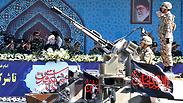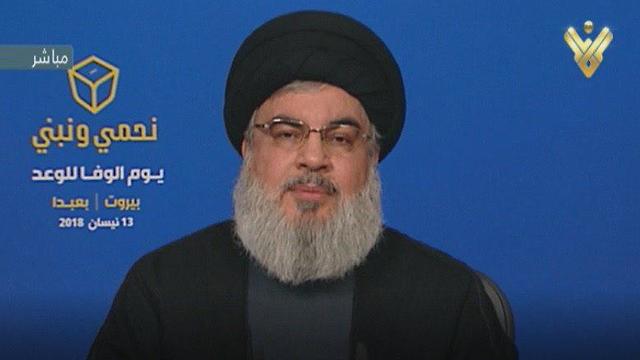
Exposure of Iranian retaliation plan may lead to its postponement
Analysis: Even if the Iranians decide to go ahead with their plan and order Syria-based militias to fire a barrage of missiles at a military base in northern Israel, the IDF’s missile interception and air defense systems will have no trouble dealing with the threat. The desire to catch Israel by surprise and inflict damage on a military target will likely prompt Iran to delay the attack.
The Iranians likely planned to carry out their retaliatory attack soon. Since Hezbollah is expected to be involved in firing a barrage of missiles on a military base on Israeli territory, the commander of the Revolutionary Guards’ Quds Force, Qasem Soleimani, likely decided together with the Revolutionary Guards’ aerospace force commander, Amir Ali Hajizadeh, to postpone the missile barrage to the day after the elections in Lebanon in a bid to catch Israel by surprise.
According to defense establishment forecasts and commentaries published in the past few days, the Iranians won’t carry out a retaliatory attack against Israel in the coming days. The Israeli estimate was that the Iranians would wait until after the elections in Lebanon and until US President Donald Trump decided whether to suspend the nuclear agreement with Iran on May 12.
Suleimani and other senior Revolutionary Guards commanders, likely with the approval of Iran’s supreme leader Ali Khamenei, reached the conclusion that Trump had already decided to suspend the nuclear agreement and that there was no point in waiting for May 12.
Moreover, the Iranians wanted to signal to Trump and to Prime Minister Benjamin Netanyahu in their planned retaliatory attack that suspending the nuclear agreement could spark a war in the Middle East and that they were determined to fight even if Israel kept attacking them.
For all these reasons, the timing was set for the current week, but with a clear intention not to affect Hezbollah’s chances of winning the elections in Lebanon. An Iranian retaliation leading to an Israeli response before the Lebanon election would have inflicted considerable damage on Hezbollah, even among Shiite voters.
The IDF is aware of the information about the Revolutionary Guards’ plan to carry out a retaliatory attack by firing missiles at a military base in northern Israel. The Military Intelligence Directorate likely monitored the preparations in Syria and Lebanon and reached the conclusion that the Iranians were trying to push off responsibility for the attack after its implementation, mainly because they don’t want to anger the Europeans, who have been supporting them on the nuclear agreement issue, and because a direct operation by the Revolutionary Guards from Syria would confirm and verify Israel’s claims that Iranian military elements are operating against it from Syrian territory.
The Iranians have been denying the Israeli claim the entire time. A verification of the claim could get them in trouble not only with the Europeans but also with Russia and with President Bashar Assad's regime, which opposes any Iranian activity that would undermine stability in Syria. Furthermore, the common Iranian practice is to act against Iran’s enemies through proxies rather than directly. Moreover, Defense Minister Avigdor Lieberman has already said that a direct Iranian attack on Israel will lead to a direct Israeli attack on Iran.

For all these reasons, the Iranians have chosen to task Iraqi Shiite militias that are already operating in Syria with the retaliatory missile attack on Israel, with direction, guidance and help from members of Hezbollah’s missile and rocket units, who are more experienced and familiar with the Israeli targets.
The Iranian retaliation will likely target Israeli military bases. Hezbollah has tried to attack these facilities several times in the past with rockets and missile in a bid to disrupt the IDF’s activity, and mainly the Israel Air Force’s activity.
It’s perfectly clear that the Iranians aren’t interested in sparking a war. They want to carry out a limited attack to avenge the killing of Iranians in Syria, in a way that would deter Israel and lead to an Israeli dilemma whether to declare war on Iran over a limited retaliation or to practice restraint.
In early 2015, Israel decided not to respond to a Hezbollah attack in the Mount Dov area following an alleged Israeli strike that killed Hezbollah commander Jihad Mughniyeh and an Iranian general. Hezbollah, on behalf of the Iranians, attacked an IDF force with antitank missiles, killing an Israeli officer and a fighter. Suleimani likely believes that Israel will practice restraint once again.
Both Iran and Israel are not interested in war and will try to contain the event. The Israeli exposure of the Iranian retaliation plan might lead to its cancellation or postponement for a long period of time. That remains to be seen.
One thing is clear: Even if the Iranians decide to go ahead with the plan and order the militias to fire a barrage of missiles at Israel, they won’t catch the IDF by surprise and the Israeli missile interception and air defense systems will likely have no trouble dealing with a barrage of missiles on a military target in the north.
Knowing its active defense systems are capable of dealing with the threat, the IDF has issued no special preparation orders to Israeli communities in the north. Furthermore, the Iranians are likely restricting themselves and their proxies to Israeli military targets rather than civilian targets, so Israeli citizens have no reason to worry.
The Iranians know that an Israeli response to an attack on civilian facilities and on Israeli civilians will be very painful, and they’re definitely not interested in that. The Iranian dilemma will likely lead to a postponement of their retaliatory attack in a bid to catch Israel by surprise and inflict damage on the attacked military target.











